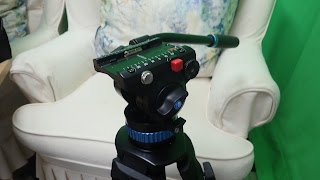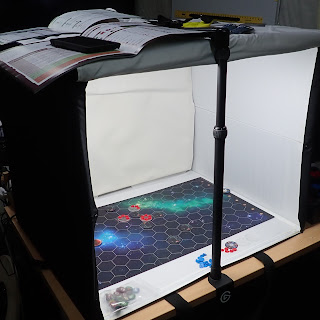All the other equipment
All the other equipment
The scene is set. The lights are ready and the talent is
miked up ready to go. The Talent has their prop in hand, so what is missing. The list is long, but you can add items as you need to.
A Background This can be a green screen or anything to hide the clutter of what you don't want people to see. Background come in all shapes and sizes and colours. The most useful are plain green or blue which can be used as greenscreens to place any other image over the top of. The one I am using here is a Manfrotto panoramic which is very wide and can be bent which easily allows shot from the front and the side.
The Tripod, or other means of holding the camera steady also
great if you want to be in the picture. Tripods range in prices and go from small to large, so which one do you need. Tripods need to firm and stable. You don't want the camera to move. Generally the larger the tripod the more stable it is. The tripod needs to able to support the weight of the camera and tripods that fold up smaller tend to be less rigid but then are easier to transport. So this is a trade-off. For work in a studio we use bigger tripods which are more stable for video cameras. Many makes many prices. We will review the best later.
The Jib, you can get those very high or low shots. We will cover how to make and use these in a later blog.
The Slider – watch the TV and you see these in action all the time. This slightly changes the angle as you are watching the video and gives a professional feel to the viewer. The slider and the jib shots can be simulated by hand held techniques.
Microphone arms and mounts - these allow the microphone to be positioned where you want the mic to be. There are all types and shapes and sizes and price ranges. The only worry here is to make sure the stand can support the weight of the mic without moving and if the mic is on a move object to ensure it has a shock proof mounting system so that the movement cannot be heard.
Boom Mic and wind noise. The Boom mic really needs a person to handle it, but it does bring the microphone close to the person speaking but out of sight of the camera. These are often seen used by news reporters. The blimp over the mic is used to cancel the wind noise and the pop filter to reduce the plosives produced by the letter "p".
The clapper board, to synchronise all the cameras – and to
mark the beginning of each shot. I use a shot of this at the start of every take of a video so I know what is going to be in the video. This is great for when you review the video prior to editing. I went over to an electronic and free version of this to run on my iPad or phone. It saves time and money for a little bit of effort in writing what each video is about.
The Script, everyone has a copy so everyone will do the same
thing each time you do a take or a retake. If you are doing this yourself you might not need all the words and put up on a teleprompter but just use bullet points to remind you of what you have to say in the right order. Hand written or word processed or specialist programs can be used. This can make a bigger production easier.
Teleprompters can be large or small
They can help people remember what to say and they can help you look down the barrel of the lens instead of reading else where which ruins the video. Some people can use them others prefer doing things off the cuff. If you need to repeat something then they become essential.
The Storyboard, brief images of the scene so that you know what shots to take and possibly in what order. Some people love these as they already know were the action will be and where the camera will need to be. For a small operation these are not really necessary but for a bigger production they become essential. The drawings and details don't have to be great its enough that you know what you are going to do.
There is even more equipment like the dolly Which gives the tripod some wheels and a track to guide the camera. I will cover all of these in more detail in later blogs.
Now you can cheat to create some of these so you don’t have
to spend a fortune or you can manage without. The only really necessary one is the tripod and that is one you can't do without.



















Comments
Post a Comment